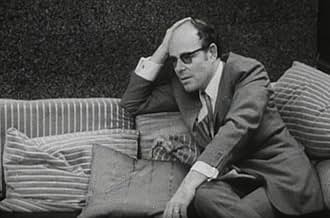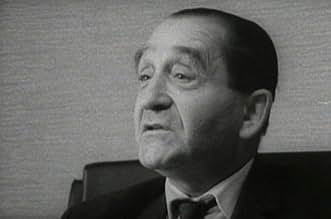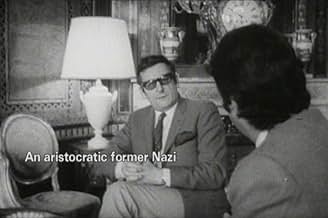Le chagrin et la pitié - chronique d'une ville française sous l'occupation
- 1969
- Tous publics
- 4h 11m
An in-depth exploration of the various reactions by the French people to the Vichy government's acceptance of the German invasion.An in-depth exploration of the various reactions by the French people to the Vichy government's acceptance of the German invasion.An in-depth exploration of the various reactions by the French people to the Vichy government's acceptance of the German invasion.
- Nominated for 1 Oscar
- 6 wins & 2 nominations total
- Self, former Wehrmacht Captain
- (as Helmuth Tausend)
- Self, general in the Wehrmacht
- (archive footage)
- (as General Stummel)
- Self, SS commander
- (archive footage)
- (as Zepp Dietrich)
- Self
- (archive footage)
- Self
- (archive footage)
- self, Former Mayor Of Combronde
- (as Monsieur Leiris)
- Self
- (archive footage)
- Director
- Writers
- All cast & crew
- Production, box office & more at IMDbPro
Featured reviews
Boy was I wrong. This turned out to be one of the most engrossing films I've seen. Yes, it is too long. But you're willing to forgive it that. This is simply the best film I've seen on World War II. Numerous interviews with French politicians, teachers, shop keepers, peasants, hoteliers, and more along with ones of Germans and Englishmen gave one of the most revealing and human portraits of World War II - and of the French people - I've seen. Combined with included archival footage from the war, this made for what is clearly one of the great all time documentaries and greatest WWII films I've seen.
TSATP draws you in right away and really never lets up. Almost every interview enlightens in some way. Everybody talking has their own agenda - spin in modern parlance - but the director is able to combine these in a way that exposes the most blantant of falsehoods and also paints a realistic composite portrait. The Nazi propaganda films were also chilling. One early example is a film of black and arabic French soldiers captured by the Nazis with the implication that racial impurity led to the French demise.
I could go on and on about this but I think I'm running out of room and need to talk about the DVD. I highly recommend this film for anyone who wants to go beyond history book versions of the war.
As for the DVD version itself, there are several flaws, starting with the $50 price tag. Beyond that, the print used was a poor one. The quality of the interview scenes was not much better than that of the archival footage spliced in. The subtitles were also not that great. Interestingly, much of disc two appeared to have a remixed soundtrack. For interviewees in English and German, the director dubbed over a partial French translation with the original language reduced in the background. This partial French translation was then subtitled in English (and not always well). On disc two, quite a few of the English sections did not have French dubbing or subtitles, which is where I suspect the sound remix comes in. The ending was also quite abrupt and choppy (Maurice Chevalier in English?) and didn't have the feel of being original, though let me stress I've no real knowledge to substantiate this.
Focusing on the town of Clermont-Ferrand, Ophüls tries to understand what it was to live with German soldiers in your town, an optimistic and collaborating government, an exiled general urging you to resist and underground organizations who used terrorism as their only weapon. Ophüls does not multiply the number of interviewees. He chooses about 15 of them and interviews them long enough that you understand their comments within the context of their personality and outlook. But the most surprising is the variety among the interviewees: a very courageous farmer, a reckless British spy, a British minister, a self-sufficient German general, a doubting German soldier, a chauvinistic bourgeois, a young nobleman attracted by the Nazi theories, a young disillusioned nobleman-philosopher ready to sacrifice his life, a clear-sighted Jewish government representative, a naïve woman, a Communist, a nationalist. You'll be surprised to find out who is the most perceptive of the bunch
The French filmmakers took care to interview French, both in support and opposed to the government of France who collaborated with Germany after their swift defeat, as well as Germans, both Nazi and otherwise and British officials who were involved in the war. With three languages present, the dialogue is spoken over in French, although in the English cut that I viewed, the English was mostly left alone.
It's not a stunning film as a documentary, in terms of presentation, but some of the stories that the film brings out of its sources are quite amazing and document a lot of details that a basic study of the WWII era during a history class might not bring out. Even more notably, the individual stories of those involved at the time highlight much of what's going on while also providing an emotional connection to a person or groups of people and making the situations easier to imagine. I think The Sorrow and the Pity remains a valuable film simply because there aren't many of its kind from its era and for how personal it chooses to be in telling the stories of the men and women that lived during this terrible moment in history. But it's really long and people who don't care about history or about people's stories probably would find much in here to like. 8/10.
Did you know
- TriviaOriginally intended for French television. However, French broadcasters refused to show it arguing the documentary depicted occupied France as exclusively populated by traitors.
- Quotes
Dr. Claude Levy: France is the only government in all Europe whose government collaborated. Others signed an armistice or surrendered, but France was the only country to have collaborated and voted laws which were even more racist than the Nuremberg laws, as the French racist criteria were even more demanding than the German racist criteria. It's not something to be proud of.
- ConnectionsFeatured in Annie Hall (1977)
- SoundtracksÇa Fait d'Excellents Français
Music by Georges Van Parys
Lyrics by Jean Boyer
Performed by Maurice Chevalier
- How long is The Sorrow and the Pity?Powered by Alexa
Details
- Release date
- Countries of origin
- Official site
- Language
- Also known as
- Le chagrin et la pitié
- Filming locations
- Clermont-Ferrand, Puy-de-Dôme, France(Main location)
- Production companies
- See more company credits at IMDbPro
Box office
- Gross US & Canada
- $13,082
- Opening weekend US & Canada
- $5,224
- Feb 26, 2023
- Gross worldwide
- $13,082
- Runtime4 hours 11 minutes
- Color
- Sound mix
Contribute to this page
















